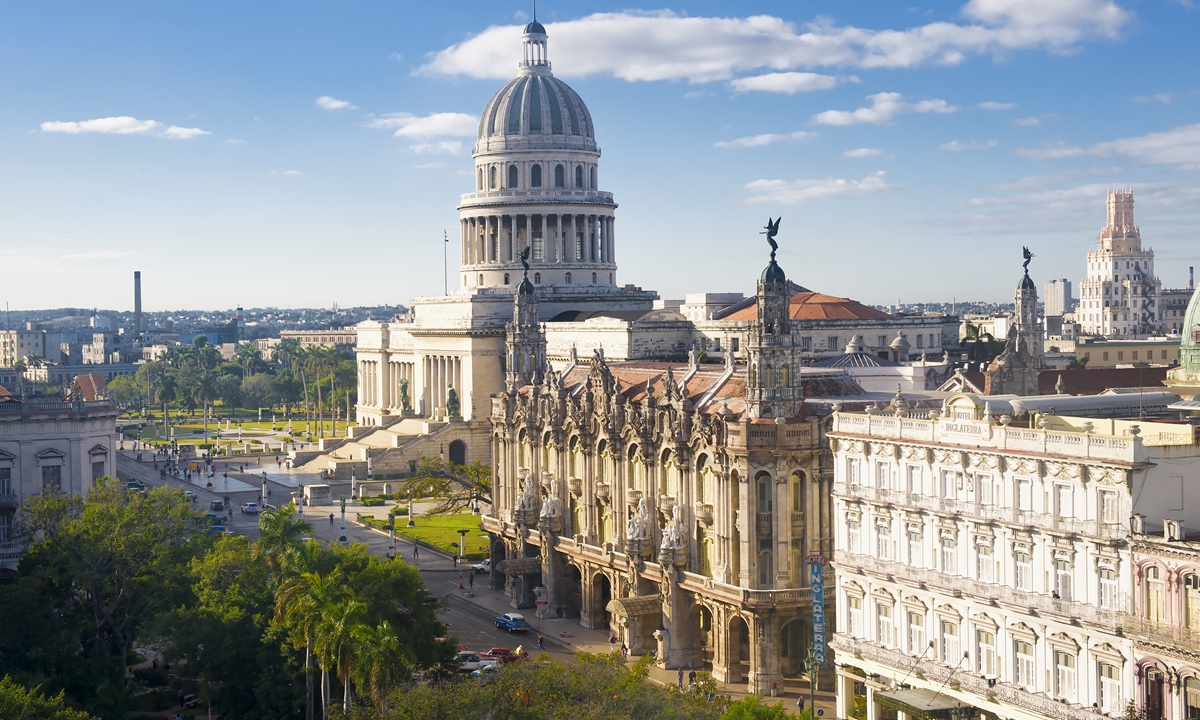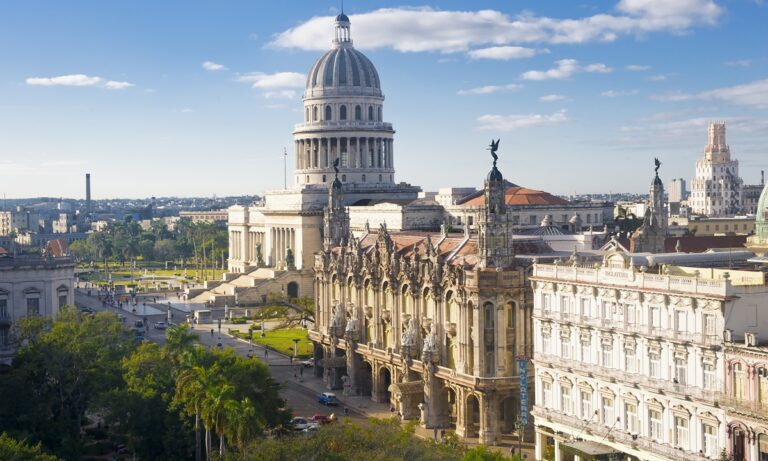
Havana, Cuba Photo: VCG
The Cuban government announced on Saturday a visa-free policy starting this month for Chinese nationals with regular passports, resulting in a 40% jump in searches for related tourism products on Chinese travel platforms and direct flights between China and Cuba. It is scheduled to reopen soon. .
The announcement was made by Cuban Tourism Minister Juan Carlos Garcia during the 42nd Cuba International Tourism Fair (FITCuba 2024) held in the seaside resort of Cayo Coco in Cuba’s Ciego de Avila province.
Garcia also announced that China will be the guest of honor at the 2025 Cuba Tourism Festival and that direct flights between China and Cuba will resume on May 17th.
Thirty minutes after the visa-free policy was announced, travel platform Ctrip saw searches for keywords such as hotels and flights in Cuba increase by more than 40% compared to the previous day, the country’s leading online travel agency said on Sunday. He told the Global Times. According to Ctrip, residents in Beijing, Shanghai, Guangdong, Zhejiang, Jiangsu, Fujian and other provinces showed high enthusiasm for information about Cuba.
Currently, there are no direct flights between China and Cuba, but Air China plans to resume the only direct flight between China and Cuba, the Beijing-Havana direct flight, on May 17th.
According to data from Chinese travel platform Qunar, a one-way ticket between Beijing and Havana currently costs about 8,200 yuan ($1,132) twice a week, while a round trip costs about 5,700 yuan.
At a business forum held in Beijing in November 2023, Cuban Prime Minister Manuel Marrero Cruz called for establishing direct flights between Beijing and Havana as soon as possible to promote trade and business. He said the two sides agreed to advance the bilateral cooperation agreement in a comprehensive manner.
Song Wei, a professor at the School of International Relations and Diplomacy at Beijing Foreign Studies University, told the Global Times that the resumption of air flights between China and Cuba is very important to promote South-South cooperation and advance China-Cuba cooperation. told. on sunday. He said increasing connectivity and strengthening integration into global value chains is particularly important for Cuba’s development, as it faces greater vulnerabilities due to its size and status as a developing island. He pointed out that there is.
Son said the resumption of flight routes will strengthen Cuba’s connections with the outside world, strengthen trade relations and contribute to strengthening its development base. He will also help reduce the impact of decades of U.S. embargoes and strengthen economic ties with the rest of the world against hegemony and unilateral sanctions.
The situation in Cuba is complex and faces many challenges due to the impact of the COVID-19 pandemic, a decades-long U.S. embargo, geopolitical uncertainty, and ongoing conflicts in the Middle East. ing. During a visit to China in November, Marrero said the Cuban government’s main task is to set economic and development goals, and that the tourism sector will be a major source of growth. Marrero expressed hope that direct flights would resume in 2024. He also said he expected a record number of Chinese tourists to visit Cuba once flights resume.
As of April 26, Cuba will receive more than 1 million international tourists in 2024, according to data from the Cuban Ministry of Tourism. The Cuban government expects to welcome 3.5 million international tourists by the end of the year.
Due to factors such as distance and cost, Cuba has not traditionally been a popular international destination for Chinese tourists. However, Latin American countries such as Cuba, Mexico and Brazil boast unique cultures and natural landscapes that are very attractive to Chinese tourists, Qin Jing, public relations manager of Ctrip Group, told the Global Times on Sunday. told.
According to Song, the tourism industry is an important economic pillar for a developing small Caribbean island country like Cuba. Improving air connectivity between China and Cuba could make it more convenient for Chinese consumers to reach Cuba, thereby significantly boosting economic development.
Pan Deng, director of the Latin American and Caribbean Law Center at China University of Political Science and Law, said the visa-free policy to China starting in May will better support Chinese tourists to increase their spending in Cuba and boost the Cuban economy. He said it can be pushed up. he told the Global Times on Sunday.
Mr. Pan said that China aims to support Cuba’s service industry and trade activities through private initiative, and the positive impact of visa-free entry is to promote economic and trade cooperation with Cuba in the tourism and service industry. said.
Additionally, the upcoming flight from China to Cuba will be truly visa-free, as no transit visa is required for this route, Pan said.
Apart from the Beijing-Madrid-Havana route, Air China also resumed the Beijing-Madrid-São Paulo route on April 28. This route, known as the longest in the world, has a total length of approximately 17,500 kilometers and a total travel time of 23 hours and 20 minutes, including stops along the way. Meanwhile, China Southern Airlines recently launched a new direct flight from Shenzhen to Mexico City. With a total length of 14,147 kilometers and a flight time of approximately 16 hours, it is one of the longest railway lines in the world.
According to Song, the resumption and opening of air routes between China, Cuba and other Latin American countries also reflects the strengthening of ties between China and Latin America.
Traditionally, Latin America has always been considered the “backyard” of the United States, and the United States considers this region to be within its sphere of influence, which has led to economic difficulties in the development of Latin American economies. Mr. Song said.
How to break free from US economic hegemony and seek more development partnerships for their own economic development, thereby consolidating their independent political and economic development, is of particular importance for Latin American countries. And that is why Latin America places such importance on it. Mr. Song emphasized the importance of developing relations with China.
Since the beginning of 2024, several countries have introduced visa-free entry policies for Chinese travelers, leading to a significant increase in outbound tourism from China. During this year’s May Day holiday, the number of bookings for visa-free flights to destinations exceeded the number of bookings in 2019.
According to Qin, this visa-free policy and the immediate opening and resumption of direct flights from China to Latin American destinations such as Mexico, Brazil, and Cuba will reduce the time and cost for Chinese tourists to travel to these destinations. , decreased significantly. More Chinese tourists are expected to travel to Latin America.

